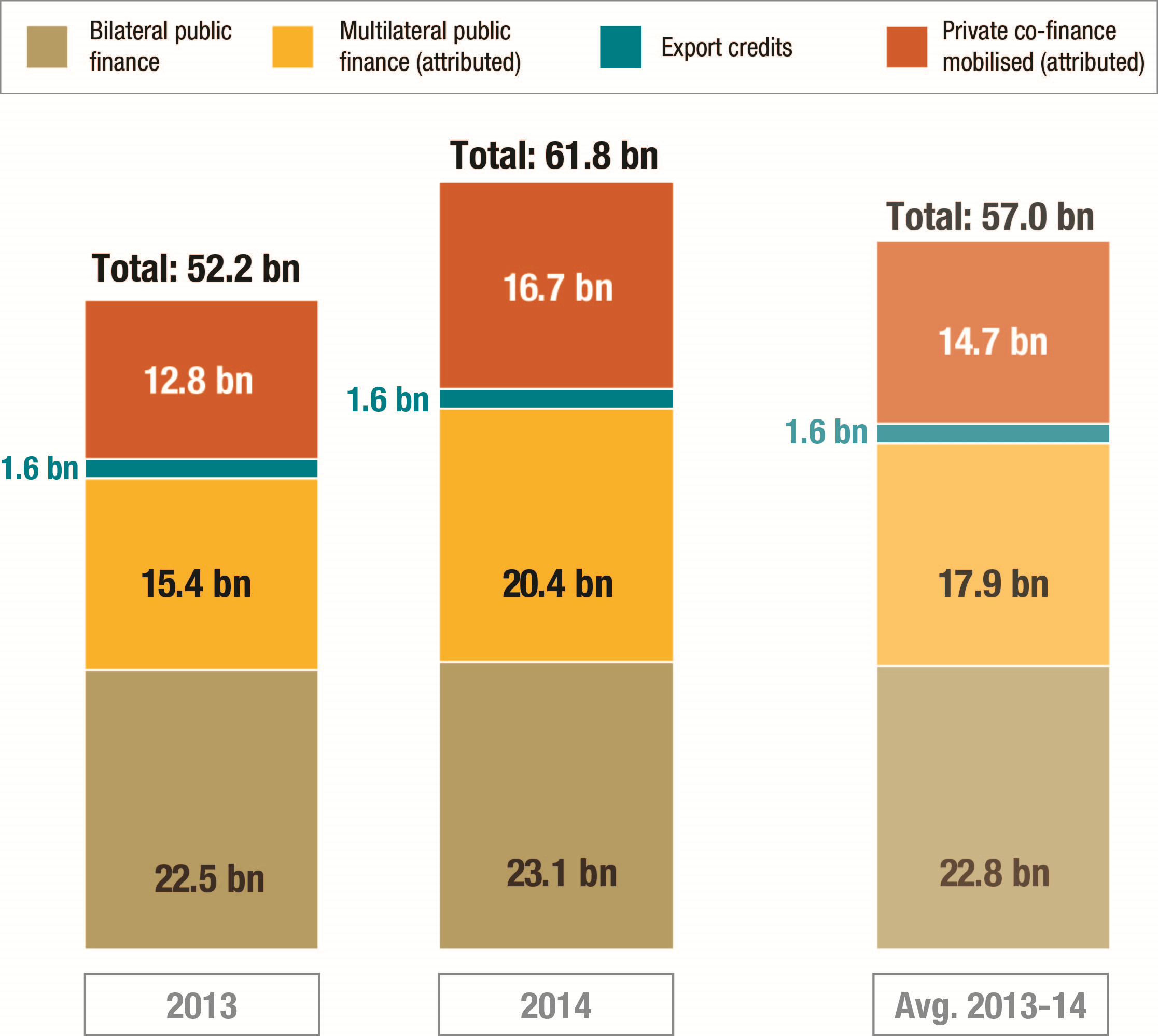Public and private finance mobilised by developed countries for climate action in developing countries reached USD 62 billion in 2014, up from USD 52 billion in 2013 and making an average of USD 57 billion annually over the 2013-14 period, according to a new OECD study in collaboration with Climate Policy Initiative (CPI).
“Climate Finance in 2013-14 and the USD 100 billion goal” provides a robust, up-to-date estimate of public and private climate finance mobilised by developed countries towards their UNFCCC 2010 Cancun commitment of USD 100 billion per year by 2020 to address the needs of developing countries to tackle and adapt to climate change.
“Our estimates paint an encouraging picture of progress. Developed country mobilised climate finance in 2014 is estimated to total USD 62 billion a year. We are about halfway in terms of time and more than halfway there in terms of finance, but clearly there is still some way to go,” said OECD Secretary-General Angel Gurría, presenting the estimate in Lima ahead of a ministerial climate financing meeting.
“Our hope is that this report will contribute to transparency and confidence-building ahead of the UN climate summit in Paris in December. The lessons learned from this exercise will pave the way for further improving the tracking and reporting of climate finance and lead to constructive discussions,” said CPI Senior Director Barbara Buchner at the same event.
The estimate of climate finance was prepared at the request of the Peruvian and French governments in the context of their responsibilities as the current and incoming presidencies of the UNFCCC Conference of Parties (COP). Climate finance flows are an important element of the negotiations in the lead up to COP21 in Paris, where countries are expected to finalise a new universal agreement on responses to climate change beyond 2020.
The report provides a preliminary aggregate estimate of public and mobilised private climate finance in 2013 and 2014. It provides an objective picture of climate flows based on data specially provided by countries and financial institutions. Finance relating to coal projects was excluded from this aggregate estimate.
The OECD-CPI report’s estimate comprises public money provided by donor governments through various instruments and institutions, including non-concessional loans. It also includes private funding for climate-related projects that have been directly mobilised by developed country public financial interventions. There is an acknowledgement of the important role played by capacity building and policy related interventions as well as enabling environments, although it is an outstanding challenge to account for these in quantitative terms.
Public finance, either bilateral or multilateral, accounted for more than 70% of the flows during 2013-14, while mobilised private finance made up more than 25% and export credits the remainder. Over three-quarters of total estimated climate finance was to support mitigation activities, with about one sixth going to support adaptation and a small share targeting both.
Released in advance of COP21 to increase transparency about progress towards the USD 100 billion goal, the report builds on other recent international efforts to improve the tracking of climate finance, including by the UNFCCC Standing Committee on Finance. The lessons learned from conducting this exercise may be helpful in informing efforts to further improve the transparency and comprehensiveness of climate finance measuring, tracking and reporting. The OECD and CPI stand ready to support such efforts.
Breakdown of climate finance in 2013, 2014 & the average over 2013-14 (USD billions)*

* The figure for multilateral public climate finance comprises funds sent through the six major multilateral development banks and key climate funds.
* The mobilised private flows (USD 14.7 billion) are approximately half through bilateral and half through multilateral channels.
* The climate-related export credits are predominantly for renewable energy.
To download the full report, click here: Climate Finance in 2013-14 and the USD 100 billion goal
OECD
Working with over 100 countries, the OECD is a global policy forum that promotes policies to improve the economic and social well-being of people around the world.
Climate Policy Initiative
Climate Policy Initiative (CPI) works to improve the most important energy and land use policies around the world, with a particular focus on finance. We support decision makers through in-depth analysis on what works and what does not. CPI works in places that provide the most potential for policy impact, including Brazil, China, Europe, India, Indonesia, and the United States.
Contact
Europe: Dan Storey, +39 324 895 7474, dan.storey@cpivenice.org
U.S.: Ruby Barcklay, +1 510 612 5180, ruby.barcklay@cpisf.org

